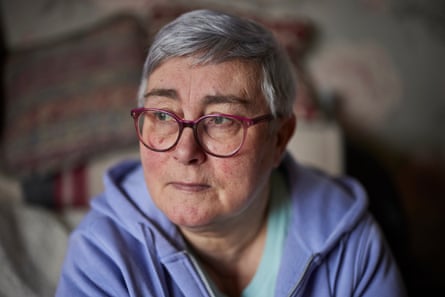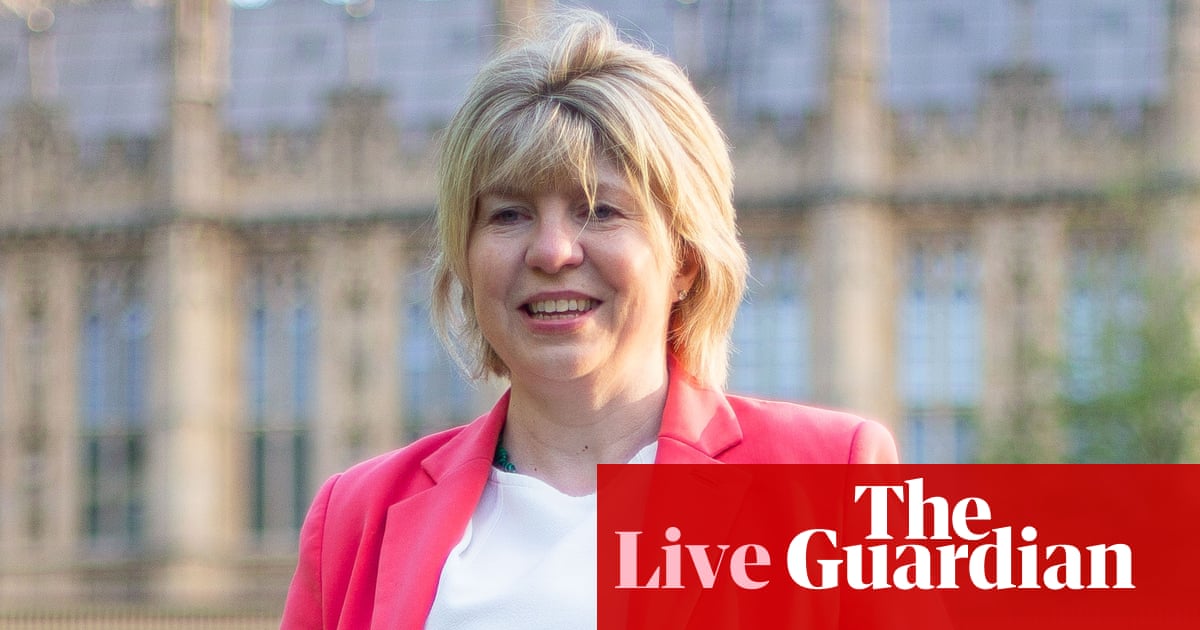
One February afternoon in 2016, Sir Robert Devereux, at the time the most powerful official in the Department for Work and Pensions (DWP), was stopped by a junior colleague as he walked through the car park of a civil service office in Preston, Lancashire. Was he aware, the worker asked, about the problems with carer’s allowance?
Devereux, on a flying visit to the DWP outpost, asked for details and promised to look into it. A few days later, Devereux’s office received a long and detailed note, complete with 80 anonymised case studies, setting out how years of shortcomings in the administration of the carer’s allowance benefit had wasted millions of pounds of taxpayers’ money and inflicted untold hardship and misery on thousands of unpaid carers.
Enrico La Rocca, a civil servant based in Preston’s carer’s allowance unit, wrote in the memo: “I have raised this issue many times with management up to directorate level and I have been consistently disappointed and depressed by the lack of will to improve things. I hope you will be able to put this right.”
La Rocca’s warnings, shared with his union, centred on the issue of carer’s allowance overpayments. The benefit is paid to about 1 million unpaid carers – people who carry out the arduous and demanding task of providing round-the-clock care for frail, sick or disabled loved ones. It is the UK’s lowest-value benefit, worth £83.30 a week.
Those who claim it are allowed to work part-time but there is a strict limit on how much they can earn: if they earn a single penny over that limit – £196 a week – their entire benefit is considered to be an overpayment, a debt that is then owed to the DWP.
This so-called “cliff edge” means a carer who earned £1 more than the threshold for 52 weeks would pay back not £52 but £4,258.80. The effect had created a debt trap, and La Rocca could see thousands of people falling into it.
La Rocca, a carer’s allowance specialist with two decades of service under his belt, had become increasingly alarmed, but his attempt to raise the alarm in the Preston car park was not the gamechanging intervention he hoped it would be.
Instead, it would be the first in a series of spurned opportunities to put things right. What followed was a groundhog day sequence of DWP complacency, inertia and cover-ups.
The DWP would deny there were problems; when the problems became no longer deniable, it would typically insist carers themselves were at fault and promise that new technology would ride to the rescue. There would be no apologies. Little would change. The injustices borne by carers, meanwhile, would rumble inexorably on.
By the time a Guardian investigation exposed the scale of the scandal last year, the cost of that failure to put things right eight years previously had become vividly real: hundreds of thousands more carers caught in a web of avoidable misery and debt over minor rules breaches, thousands more prosecuted for fraud, and hundreds of millions more pounds of taxpayers’ money wasted.
The invisible world of unpaid carers would leap on to the front pages of national media, become a staple of daytime TV and a political talking point. It would be regarded as a social policy disaster. And, as a result of the way it pitted a vast and ruthless bureaucracy against powerless and vulnerable carers, it would be routinely compared to the Post Office scandal.
Criminalising care
Last year, Vivienne Groom, then 59, wept as she stood in the dock at a court in Chester. A shy, quiet woman with an unblemished criminal record and without even a parking ticket to her name, she had been convicted of benefit fraud and handed a 12-month community order.
She was told the £16,000 inheritance left to her by her late mother, to whom she had provided full-time unpaid care for years, would be confiscated by the state. To do so, the government was using the proceeds of crime laws – legislation designed to seize the ill-gotten mansions and speedboats of gangsters and drug smugglers.
Groom’s crime was to have earned marginally more in her part-time job in a Co-op store than was allowed under strict carer’s allowance benefit rules. For five years while caring full-time for her elderly mother, who had had a stroke, she supplemented her meagre carer’s allowance – then £60 a week – by working 16 hours a week for the minimum wage.

At a hearing the previous November, the judge seemed to accept Groom’s claim that she had made an “honest mistake”. As Groom had admitted guilt, the judge had little option but to convict her, but he made it clear he would not send her to prison – despite benefit compliance officers having told her she faced up to seven years in jail. There were a “wealth of mitigating factors” in her favour, the judge pointed out, and no aggravating ones. “You were doing the best for your mother,” he declared.
Although Groom said she did not know she was breaching carer’s allowance earnings rules, the DWP did – or at least it should have known. Over the five years during which she received carer’s allowance, the Guardian estimates the DWP would have received between 15 and 50 electronic alerts warning that Groom had breached earnings limits.
Had civil servants checked the alerts at the beginning of her claim in late 2014 they could have telephoned her, warned her of the infraction and cancelled the benefit. The amount she would have had to repay would have been nearer £1,500, way below the £5,000 threshold for criminal prosecution, and a tiny fraction of the £17,000 she was eventually forced to repay. Had the alerts been checked, Groom’s inheritance and her reputation would have remained intact.
Instead, the data highlighting Groom’s inadvertent earnings infringements were repeatedly missed by the DWP. She was not an unusual case in this regard. According to the National Audit Office, around this time just under 12% of the 3,000 earnings alerts arriving at the department’s carer’s allowance section each month were being checked.
That its own administrative shortcomings were in part responsible for the overpayment seems not to have crossed the DWP’s mind when it referred her case to the Crown Prosecution Service. Vivienne’s husband, Geoff, summed up the bitter disbelief and injustice felt by many unpaid carers about their treatment: “Viv is being punished now for looking after her mum,” he told the Guardian when the ruling was handed down last year. “The DWP are the criminals here. This can’t be right.”
The cliff edge
The Guardian has seen evidence of scores of similar examples of “cliff-edge” cases, where minor earnings breaches resulted in life-changing debt. In one case a Lancashire school dinner lady was allowed to accrue overpayments over a five-year period from 2013. Her earnings never exceeded the limit by more than £14.52 in any week; in some periods she overstepped the weekly threshold by just 29p. During the entire period she earned just £1,900 more than she was allowed. Under the “cliff-edge” rules she was forced to repay £14,000.
But it was not just the cliff edge itself that created such a huge overpayment. For years the DWP has received regular electronic alerts from HMRC warning it if a carer has potentially earned more than the weekly carer’s allowance earnings limit. In theory, by hiring enough staff to check the alerts and act on them speedily, it could identify and eliminate overpayments within days. But as Groom found to her cost, it appeared reluctant to do so.
The real-life consequence of this underpowered data-matching policy was to push carers who worked part-time around the edges of the earnings limit into a random high-stakes lottery: a breach of the limit might be spotted by DWP straight away, it might rumble on for years before finally being detected, or it might never be spotted at all. A carer who fell foul of the earnings rules might randomly end up repaying nothing, £70 or £17,000.
La Rocca’s February 2016 memo to Devereux highlighted this. “Because of the limits CAU (Carer’s Allowance Unit) have put on data-matching in recent years, overpayments that we could have picked up after less than a year have been allowed to extend to two or three years or even longer,” he wrote. It was “routine” to identify earnings-related overpayments of £5,000 or more, he added. He’d even seen one for £24,000.
Five months later one of La Rocca’s managers replied to the memo. The issues he raised had been investigated. They grudgingly admitted that administrative failures had indeed occurred, but said an action plan was now in place – “the overarching control environment will be enhanced”, the jargon-heavy email promised.
No thanks were offered to La Rocca for bringing the failures to light. Clouded in management-speak as it was, the message was crystal clear: La Rocca should lay off now; the problem was sorted and the case closed.
Meanwhile, a stream of avoidable overpayments continued to flow across La Rocca’s desk. He wrote to the DWP’s financial controller in March 2017 to warn that little seemed to have changed, but he was rebuffed. Everything was in hand, he was assured, and there would be no “further correspondence” on the matter.
Increasingly frustrated, he wrote to Devereaux’s successor as DWP permanent secretary, Peter Schofield, a year later in August 2018. What horrified La Rocca was not just that the DWP had allowed thousands of carers to build up massive overpayment debts, but the department was preparing to prosecute hundreds of carers for benefit fraud.
“I cannot see how the department can justify instigating a fraud drive on these cases … when [the] DWP is at least partially responsible for allowing their overpayments to continue unchecked,” he wrote. He added, again with eerie prescience: “I would not be surprised if part of the true picture of the unfortunate circumstances behind these cases emerged at some point and the department would inevitably be seen in a bad light.”
La Rocca did not get a reply until November 2018. A senior DWP director, writing on behalf of Schofield, refused to accept there was much wrong with carer’s allowance compliance work. The onus was on carers, not the DWP, to report “changes in circumstances” such as earning over the limit, regardless of whether they knew that had done so.
Besides, they added, in what was clearly intended to be a clincher, the department’s earnings compliance technology was being upgraded as part of a drive to prevent overpayments.
Audits, alerts and more missed warnings
La Rocca felt his concerns were again being swept under the carpet. However, unpaid carers were about to get a very public champion. Frank Field, a veteran Labour MP and the respected chair of the Commons work and pensions select committee, had got wind of the issue.
Field had begun to extract carer’s allowance data from the DWP, What he uncovered profoundly shocked him. Not only were tens of thousands of claimants running up carer’s allowance debts, but the amounts were huge.
In 2016, when La Rocca first raised the issue with DWP top brass, the largest overpayment debt was £47,800; the following year it was £42,000. In 2018, Field discovered a claimant had been hit with a £48,500 bill, a breach that had clearly gone undetected by the DWP for many years.
The massive financial risks triggered by the carer’s allowance trap were being unfairly placed on unpaid carers, Field realised. He wrote to the public spending watchdog, the National Audit Office, demanding an urgent investigation. “It is deeply concerning that the department has allowed claimants to accrue such eye-wateringly large overpayments,” he said. “More than just an oversight, these figures suggest that systematic failings or gross incompetence – or a combination of the two – are at play.”
He went on: “It is carers who will bear the brunt of these failings as the department seeks to claw back the money from people who can ill afford to lose it.”
Field launched a work and pensions select committee investigation into carer’s allowance. Its conclusions, published in early August 2019, were devastating: the design of the benefit in effect “set carers up for a fall”. Years of complacency and under-resourcing had allowed overpayments to “spiral out of control”, not least because of the DWP’s reluctance to properly check earnings alerts.
It said carers had been heavily penalised for making “honest mistakes”. The committee was furious that Schofield, who had appeared before MPs two months earlier, had refused three times to apologise for the mess. The inquiry set out no fewer than 19 recommendations for change. The DWP, it concluded angrily, had “stuck its head in the sand and done nothing”.
If at this point there was political pressure to fix carer’s allowance – and the DWP had promised MPs it would do so – it was not to last. Within months, in December 2019, a general election was held. The committee was disbanded and Field and other key MPs lost their seats. Three months later, Britain was in Covid lockdown. The righteous head of steam building around carer’s allowance disappeared.
What did not disappear was the broken benefit that was quietly continuing to ruin lives, and the fundamental flaw that with every passing week was tipping more carers into debt and potential criminality.
‘Never again’
In April 2024 the Guardian revealed that tens of thousands of unpaid carers were still inadvertently running up massive overpayments each year, hundreds of whom had been prosecuted for fraud. Scores of carers contacted us, each with vivid and harrowing tales to tell. Many were angry that the same politicians who glibly praised them as “unsung heroes” were happy to oversee a brutal system that was seemingly quick to label them as fraudsters.
The scandal of a minor benefit administered in a cruel and unfair manner had become an issue for daytime TV and late-night political debate. Emboldened, carers began to fight overpayment decisions in tribunals – and win. But despite broader awareness, families were still being caught out.
In January this year, Guy and Oksana Shahar, a couple who cared for their autistic son, Daniel, 15, received a letter from the DWP. “Important,” it read in bold type. “You have been paid more carer’s allowance than you are entitled to. You now need to pay this money back”.
The sum being demanded by the government was staggering: £10,180.45.

Oksana, a dinner lady who had a zero-hours contract to do shop work in Sports Direct, was certain this could not be an earnings breach related to carer’s allowance. As a carer, she had followed the unfolding scandal carefully and thought she was safe from its pitfalls. But when the letter from the DWP arrived, she realised the fine margins by which a carer could be ensnared in the debt trap.
Oksana had overstepped the earnings limit by an average of £1.92 a week over a five-year period. In some weeks she was paid just 38p more than the threshold – but for that tiny infraction she is being forced to repay £64.60 each time, the rate of carer’s allowance at the time.
The debt, Guy said, would “devastate us financially”.
Almost 10 years on from La Rocca’s warning to Devereux in the Preston car park, the letters are still being sent and carers every week are unknowingly falling into debt. So far 600 have been convicted in court and legal action against more is continuing.
In April last year, Keir Starmer – soon to become prime minister – was asked about Groom’s case on a visit to the north-west of England. “Something has gone very wrong here,” he replied. “We cannot allow that to happen again.” In October, Liz Kendall, Starmer’s work and pensions secretary, vowed to “put things right”, and in December the Labour government announced an independent review of carer’s allowance overpayments and promised a “new settlement”.
The Labour government has introduced some early changes to reduce overpayments being created by extending the earnings limit and promising to fully investigate 100% of earnings alerts.
A DWP spokesperson said: “We understand the huge difference carers make, as well as the struggles so many face. The carer’s allowance overpayment rate is now the lowest on record and we are increasing funding and bringing in more staff to check 100% of alerts to help prevent carers falling into debt.
“But we want to go further. That’s why we’ve launched an independent review of carer’s allowance, to explore how earnings-related overpayments have happened and what changes can be made.”
But for carers with debts to pay, and for those who may yet still fall into the carer’s allowance debt, the promises of politicians have not left them any less vulnerable. Groom, who took care of her elderly mother until her dying breath, remains a convicted criminal, and her life inheritance now belongs to the state.
The carer’s allowance scandal – because of which 144,000 carers are repaying more than £251m – continues to claim victims and will do so for the immediate future as the DWP works its way through thousands of backlogged overpayments.
The injustices and cruelty of the system may be with us for some time. The Shahars are appealing against the overpayment demand. “It just seems so unfair that it’s not even real,” said Guy, words that would undoubtedly echoed by hundreds of thousands of other carers. “In any sort of ethical world, this would not happen.”

 3 months ago
150
3 months ago
150

















































